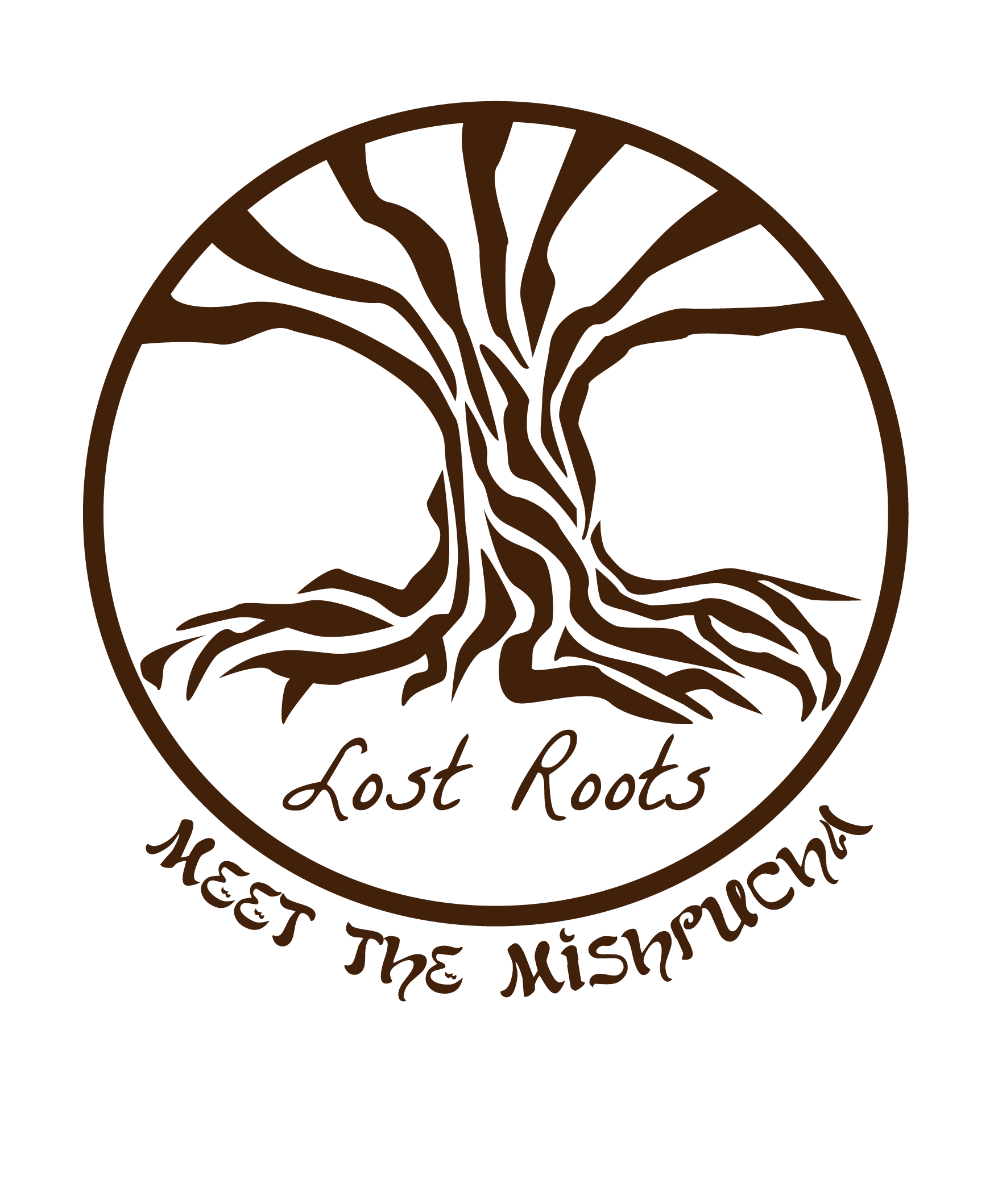Jewish Genealogy Databases and Other Resources
As with many other fields, the application of computer technology has revolutionized the practice of genealogy. With a good database for your region, you can accomplish more than you previously could have in months of intensive onsite research. Moreover, advanced search techniques allow new types of insights and analyses that previously would have been exceedingly difficult if not impossible.
A wide assortment of databases and other online resources exists for Jewish families from Central and Eastern Europe. Each has its own focus, whether geographical area or resource type. While a comprehensive listing of every available resource is impossible, this page aims to be a useful listing of many of the main ones.
JewishGen
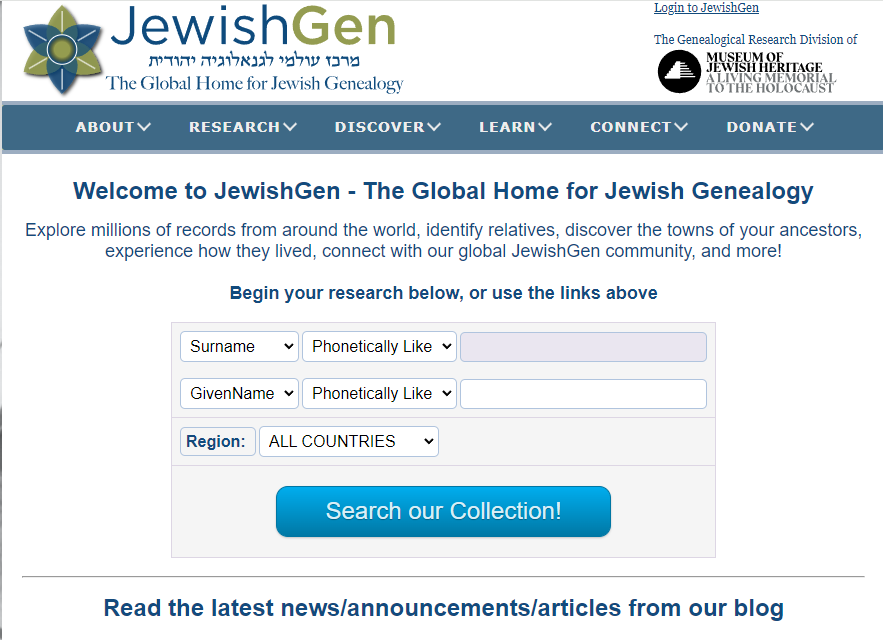 The largest Jewish genealogy organization in the world, JewishGen (https://jewishgen.org/) spans hundreds of Jewish genealogical collections from scores of countries. An umbrella organization encompassing dozens of Jewish genealogy research associations, JewishGen functions as a world center of Jewish genealogy.
The largest Jewish genealogy organization in the world, JewishGen (https://jewishgen.org/) spans hundreds of Jewish genealogical collections from scores of countries. An umbrella organization encompassing dozens of Jewish genealogy research associations, JewishGen functions as a world center of Jewish genealogy.
The core of JewishGen is its powerful search feature, which allows users to access indexes and transcriptions of tens of millions of records of genealogical significance. In addition, JewishGen maintains a huge assortment of educational resources. Chief among these are its so-called “info files” which offer background information, research suggestions, descriptions of archival holdings, and much more. The organization also features online classes and educational videos.
In JewishGen’s own words, “We can’t live in the past, and we can’t reclaim it. But we can allow the memories of the past to shape us, to shape our sense of identity, and to shape what we will be transmitting to future generations.”
JRI-Poland
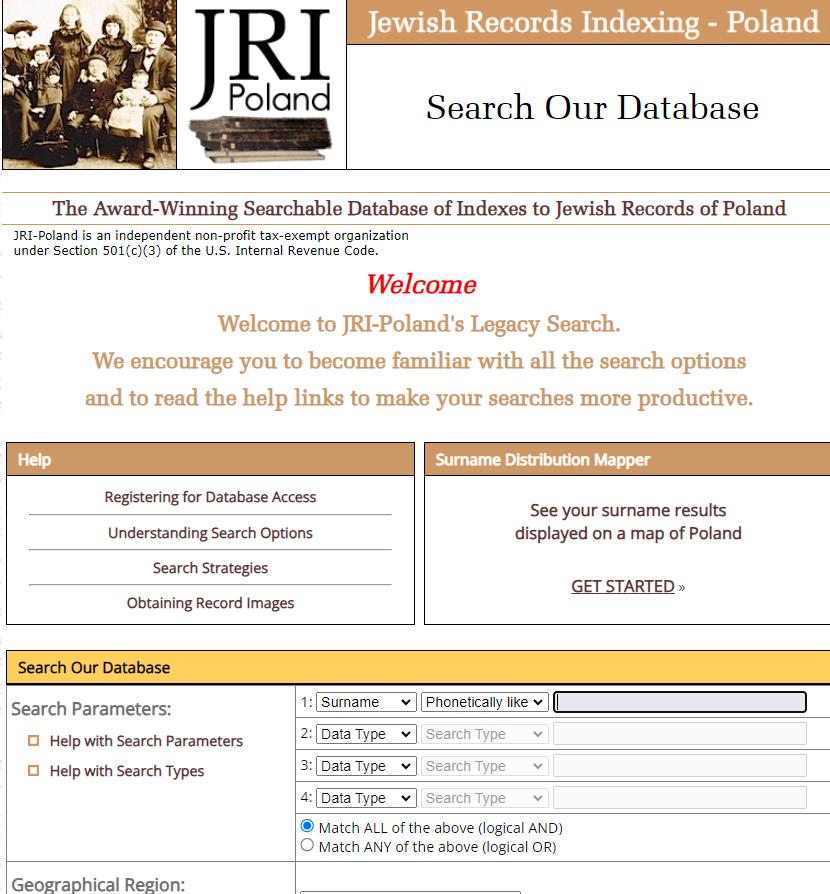 Founded in 1995 by Stanley Diamond, Steven Zedeck, and Michael Tobias, JRI-Poland has indexed tens of millions of Jewish birth, marriage, and death records from Congress Poland, Prussian Poland, and Galicia. In addition, the organization also covers a large collection of other records, including nineteenth- and early twentieth-century population registration books, marriage alegata, cemetery records, and other sources.
Founded in 1995 by Stanley Diamond, Steven Zedeck, and Michael Tobias, JRI-Poland has indexed tens of millions of Jewish birth, marriage, and death records from Congress Poland, Prussian Poland, and Galicia. In addition, the organization also covers a large collection of other records, including nineteenth- and early twentieth-century population registration books, marriage alegata, cemetery records, and other sources.
Thanks to the work of teams of volunteers, the organization has created a vast storehouse of knowledge of the Polish Jewish community of the late 18th through early twentieth century. As such, JRI-Poland is indispensable to any families with roots in one of the largest and most important Jewish communities of prewar Europe.
Gesher Galicia
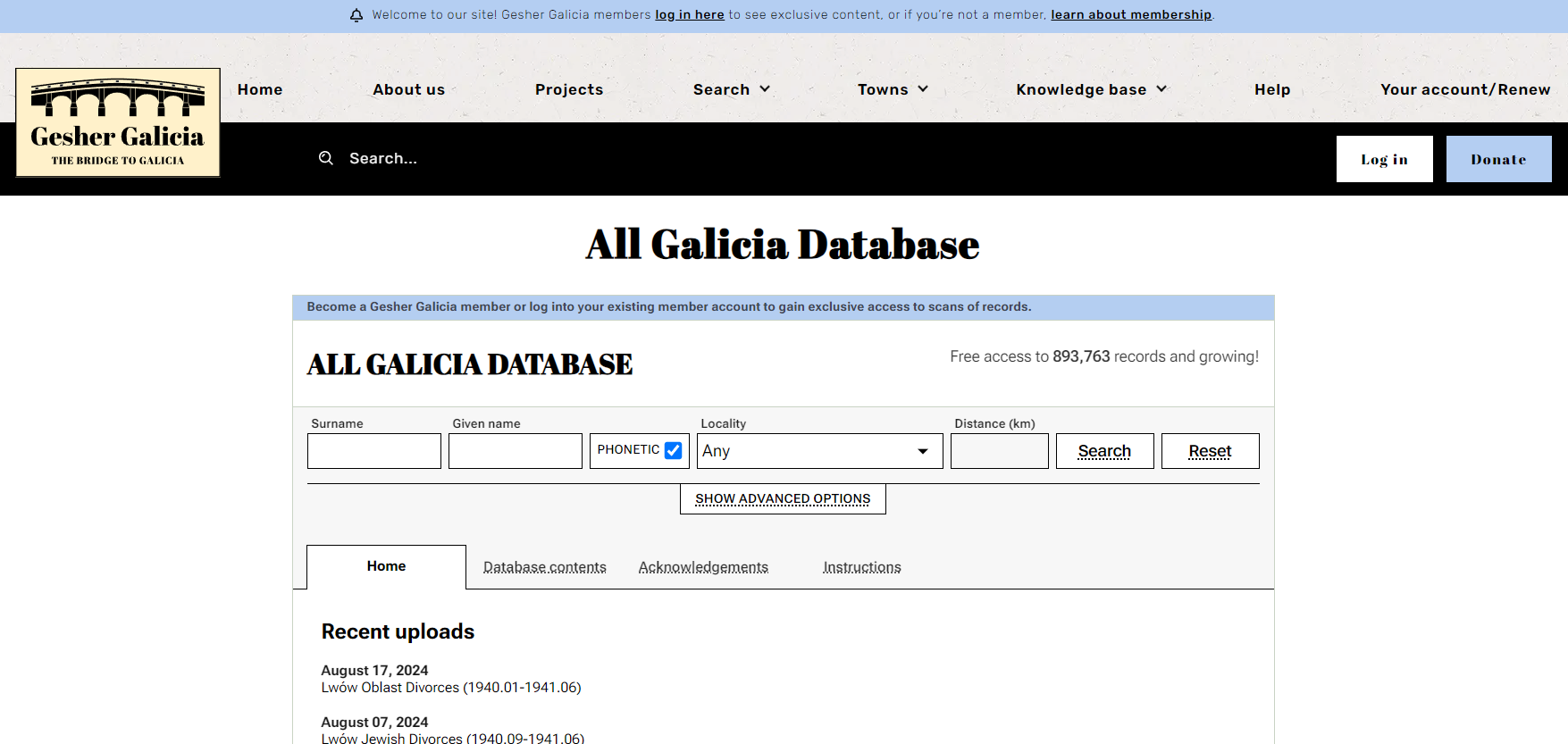 A key research association focusing on Jewish genealogy in Galicia, the north-easternmost province of the former Austro-Hungarian Empire, Gesher Galicia has indexed millions of historical records concerning the Jewish community of this region. In addition to birth, marriage, and death records, the organization has also indexed census books, landownership documents, tax and other government records, Holocaust documentation, and more. Moreover, its large eighteenth- and nineteenth-century map collection documents land ownership, property boundaries, topography, and physical features of our ancestors’ daily lives. Gesher Galicia also maintains a research journal, The Galizianer.
A key research association focusing on Jewish genealogy in Galicia, the north-easternmost province of the former Austro-Hungarian Empire, Gesher Galicia has indexed millions of historical records concerning the Jewish community of this region. In addition to birth, marriage, and death records, the organization has also indexed census books, landownership documents, tax and other government records, Holocaust documentation, and more. Moreover, its large eighteenth- and nineteenth-century map collection documents land ownership, property boundaries, topography, and physical features of our ancestors’ daily lives. Gesher Galicia also maintains a research journal, The Galizianer.
There is some degree of geographical overlap between Gesher Galicia and JRI-Poland, as some of the latter’s records also cover Galicia. However, in the areas of overlap, they take their material from different archives which contain different records–often from different time periods. For this reason, the two research organizations complement one another when researching Jewish families in Galicia.
The myriad tools and resources of Gesher Galicia allow us to reconstruct Jewish life in this highly important region.
Yad vaShem
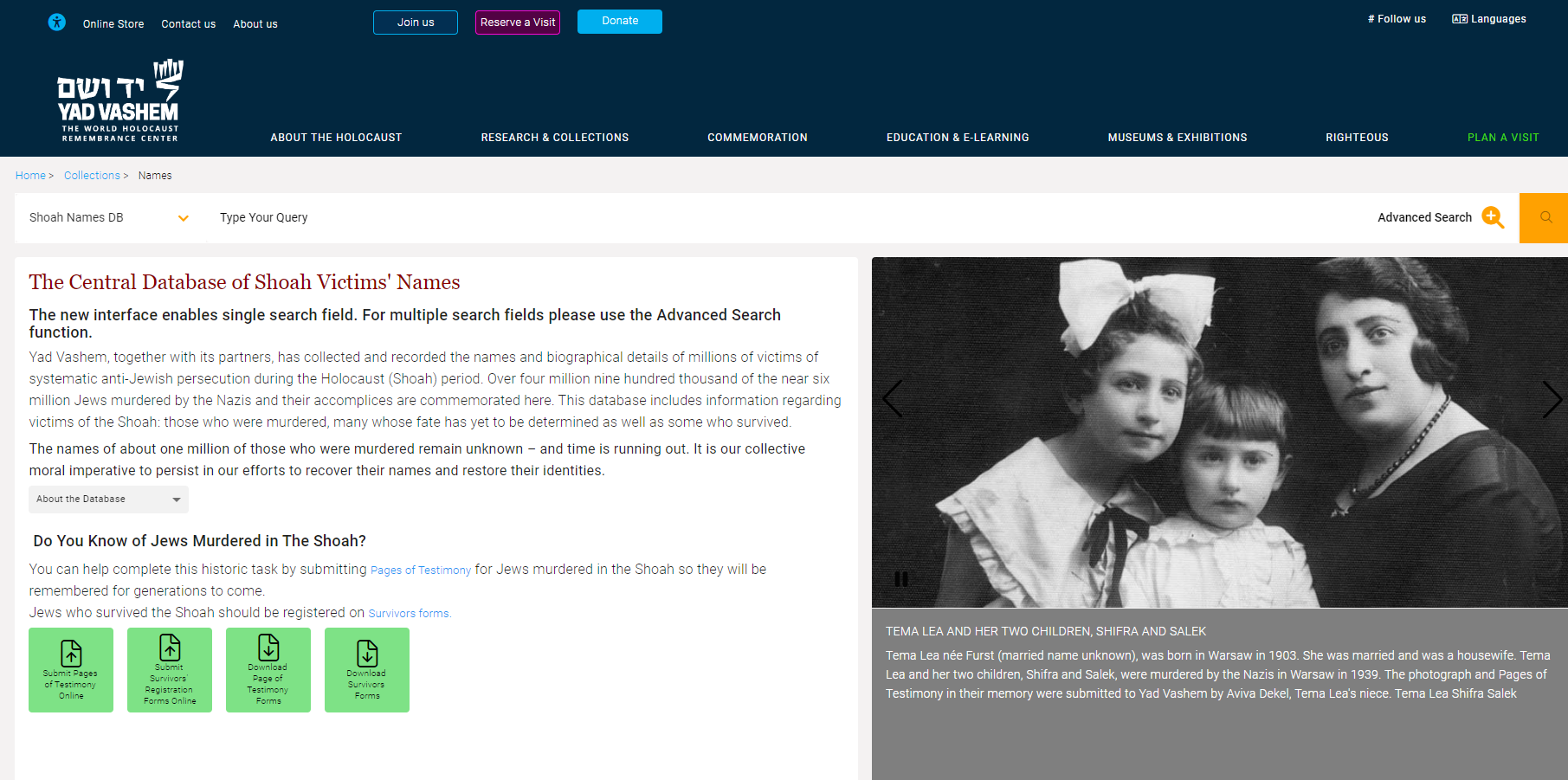 The world’s preeminent Holocaust museum and memorial, Yad vaShem was established by the Israeli government in 1953. The institution is devoted to documenting and commemorating the six million Jews murdered by the Nazis. It honors the memory of those who perished, those who courageously resisted, and tens of thousands of non-Jews who risked their lives rescuing Jews.
The world’s preeminent Holocaust museum and memorial, Yad vaShem was established by the Israeli government in 1953. The institution is devoted to documenting and commemorating the six million Jews murdered by the Nazis. It honors the memory of those who perished, those who courageously resisted, and tens of thousands of non-Jews who risked their lives rescuing Jews.
Yad vaShem maintains the world’s largest repository of Holocaust documentation spanning tens of millions of pages. The institution maintains millions of pages of testimony given by family members of the deceased, documenting their names, lives, and fates. Also included are countless files of contemporaneous and post-fact documentation. As stated on its website, Yad vaShem “continually strives to meaningfully impart the memory and meanings of the Holocaust to future generations.”
Routes to Roots Foundation
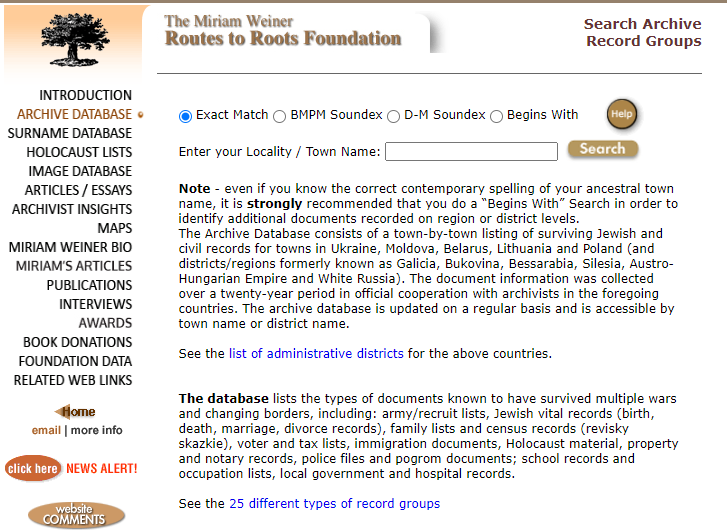 Established in 1989, Routes to Roots Foundation set the foundation of modern Jewish genealogy research. Its founder, Miriam Weiner, was the first Jewish genealogy researcher invited to work in Eastern European archives. Beginning its work in Poland shortly before the fall of the Communist regime, Routes to Roots has scoured archives throughout Central and Eastern Europe.
Established in 1989, Routes to Roots Foundation set the foundation of modern Jewish genealogy research. Its founder, Miriam Weiner, was the first Jewish genealogy researcher invited to work in Eastern European archives. Beginning its work in Poland shortly before the fall of the Communist regime, Routes to Roots has scoured archives throughout Central and Eastern Europe.
The core of Routes to Roots is its database listing archival holdings in Poland, Lithuania, Belarus, Ukraine, and Moldova. With a single click, users can find listings of all known records in European archives for virtually any town of interest in these countries. Data has been collected since 1989 and is frequently updated. The organization does not hold the actual records, but allows researchers to discover what records are available for a given town. In addition to its core focus on archival holdings, Routes to Roots’s new names database covers historic material such as city directories, and allows searching for individuals.
In the words of its founder, Routes to Roots is committed to the joys of genealogical research in which “an aging piece of paper is transformed into a profound connection between past and future.”
Genealogy Indexer
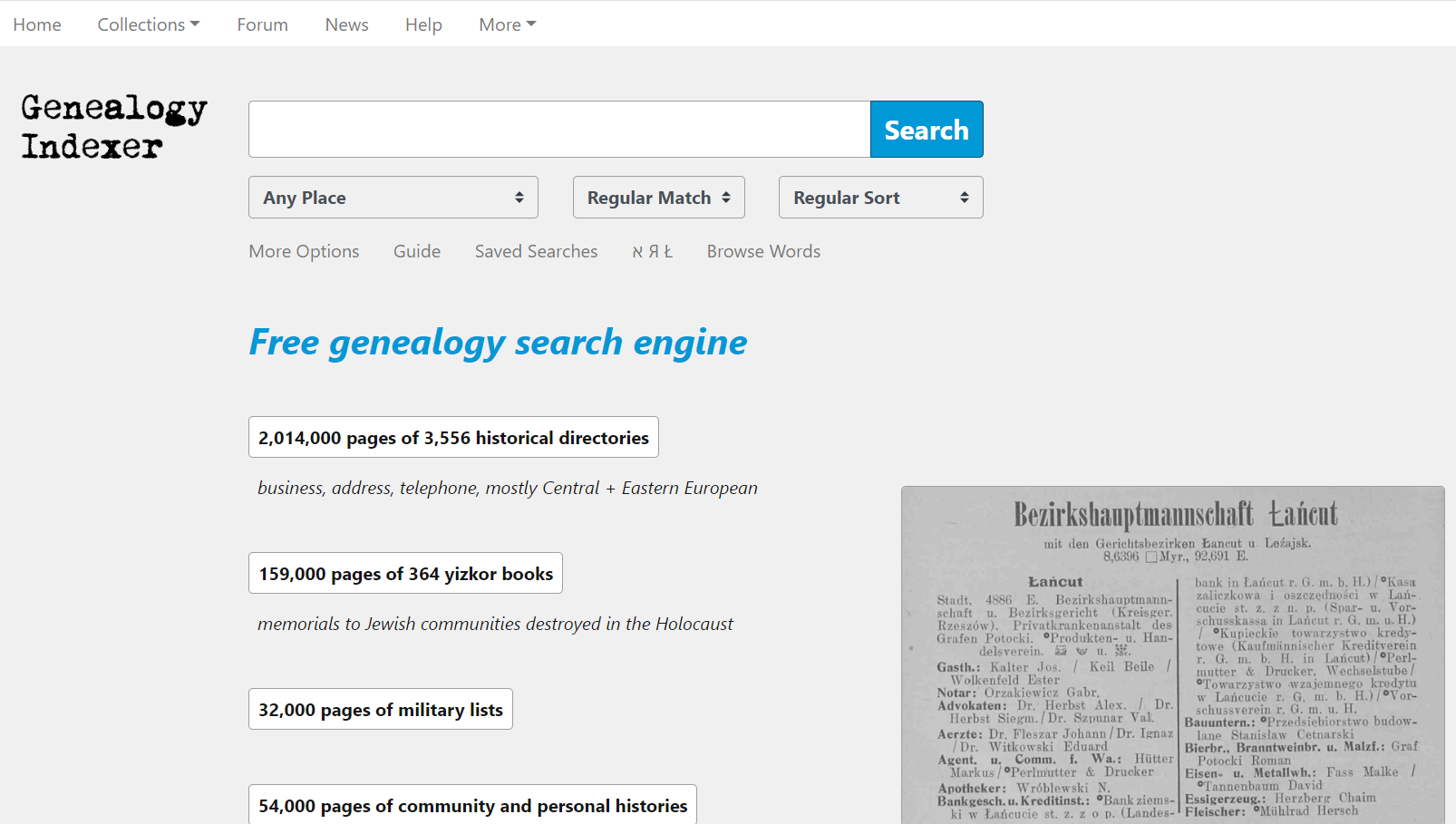 Unlike other genealogy databases which focus on standard sources of birth, marriage, and death records, Genealogy Indexer offers an online search index for thousands of historic materials such as business directories, address books, telephone books, school yearbooks, and other similar resources. Its primary focus is on Central and Eastern Europe, although its global collections also include the United States, Latin America, Israel, and other parts of the Middle East / North Africa region. Genealogy Indexer also includes hundreds of Yizkor books, memorial books written by survivors of Jewish communities destroyed during the Holocaust.
Unlike other genealogy databases which focus on standard sources of birth, marriage, and death records, Genealogy Indexer offers an online search index for thousands of historic materials such as business directories, address books, telephone books, school yearbooks, and other similar resources. Its primary focus is on Central and Eastern Europe, although its global collections also include the United States, Latin America, Israel, and other parts of the Middle East / North Africa region. Genealogy Indexer also includes hundreds of Yizkor books, memorial books written by survivors of Jewish communities destroyed during the Holocaust.
Genealogy Indexer is a highly underappreciated resource that can yield fascinating insights into the lives of our ancestors. It is highly complementary of other genealogy databases.
Jewish Genealogy Portal
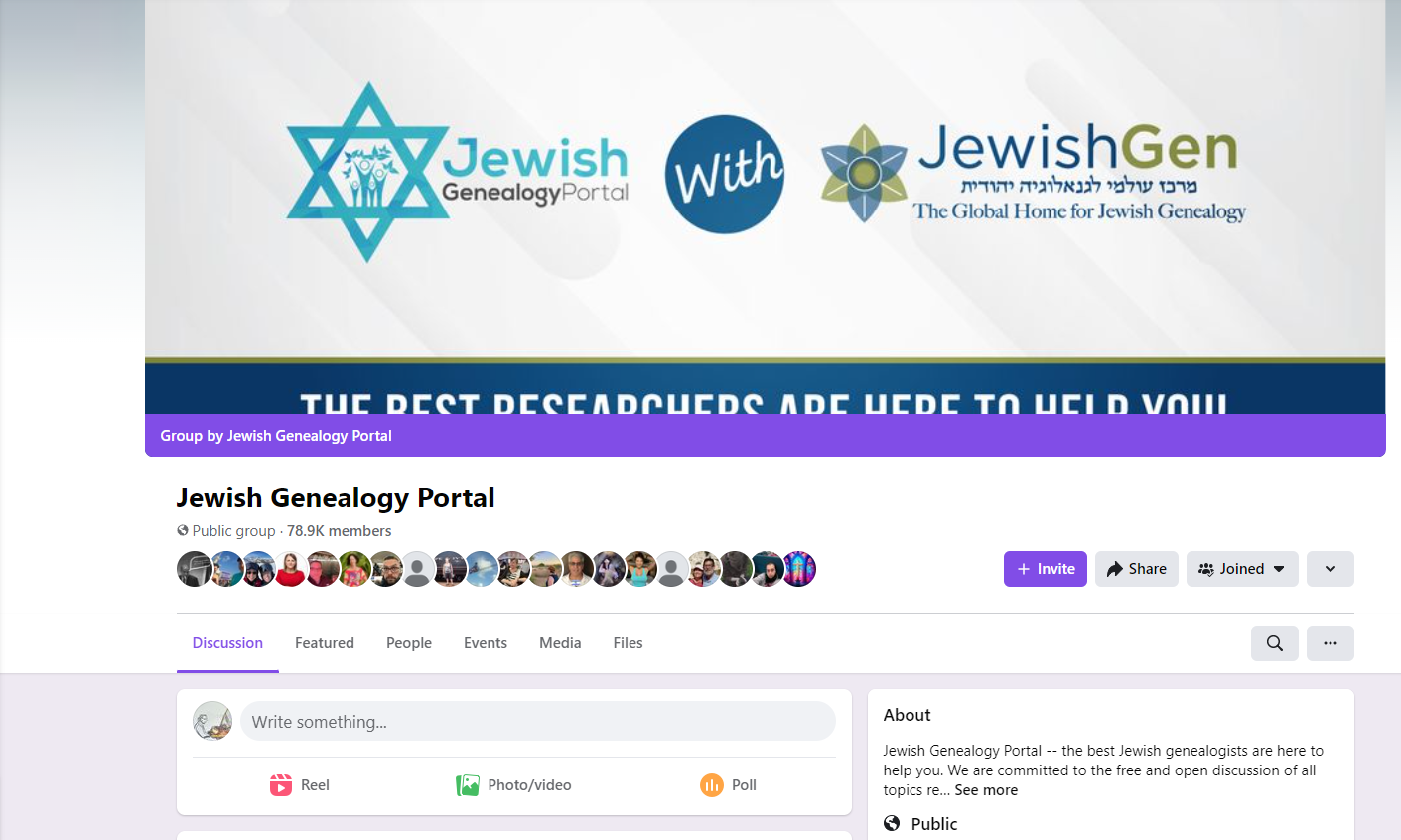 Jewish Genealogy Portal is a Facebook group devoted to assisting Jewish genealogy do-it-yourselfers conduct their own research. The discussion page offers suggestions, guidance, occasional translations, and support from other hobbyists from around the world.
Jewish Genealogy Portal is a Facebook group devoted to assisting Jewish genealogy do-it-yourselfers conduct their own research. The discussion page offers suggestions, guidance, occasional translations, and support from other hobbyists from around the world.
Alex Krakovsky
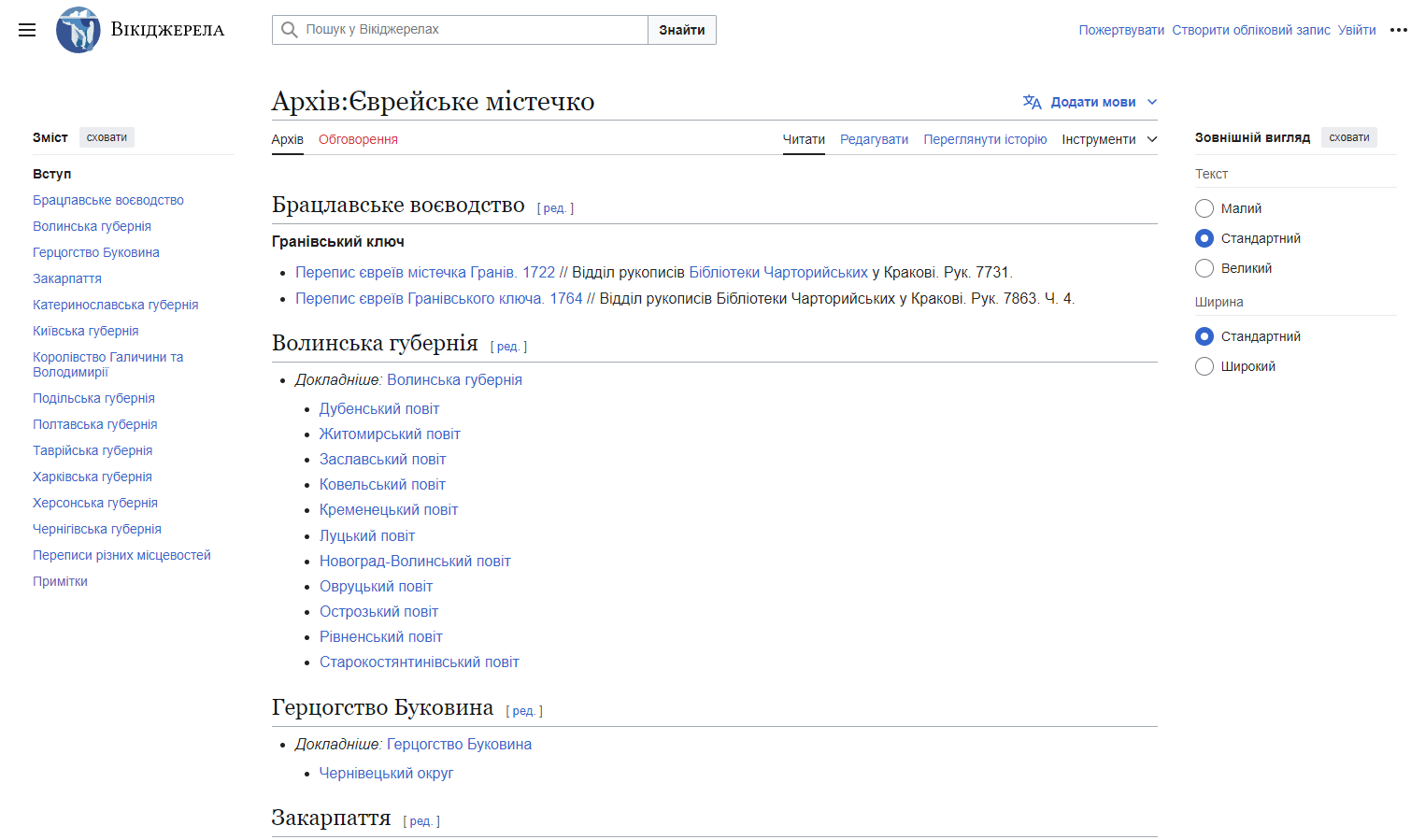 As described in more detail in my Ukraine Jewish genealogy page, Alex Krakovsky has successfully secured access to hundreds of thousands of Jewish records held in government archives in Ukraine. After many court victories, he has created an online trove of documents of Jewish genealogical significance spanning virtually the entire country, documenting Jewish life in big cities and small towns alike and spanning the eighteenth through twentieth centuries.
As described in more detail in my Ukraine Jewish genealogy page, Alex Krakovsky has successfully secured access to hundreds of thousands of Jewish records held in government archives in Ukraine. After many court victories, he has created an online trove of documents of Jewish genealogical significance spanning virtually the entire country, documenting Jewish life in big cities and small towns alike and spanning the eighteenth through twentieth centuries.
Krakovsky’s site is not a database and is not text searchable, although some have indexes. The documents found on it are arranged by geographic area. The vast majority of the material on Krakovsky’s site is handwritten in Russian cursive. While decidedly not beginner friendly, the site holds the story of hundreds of years of Ukrainian Jewry.
Statue of Liberty – Ellis Island Foundation
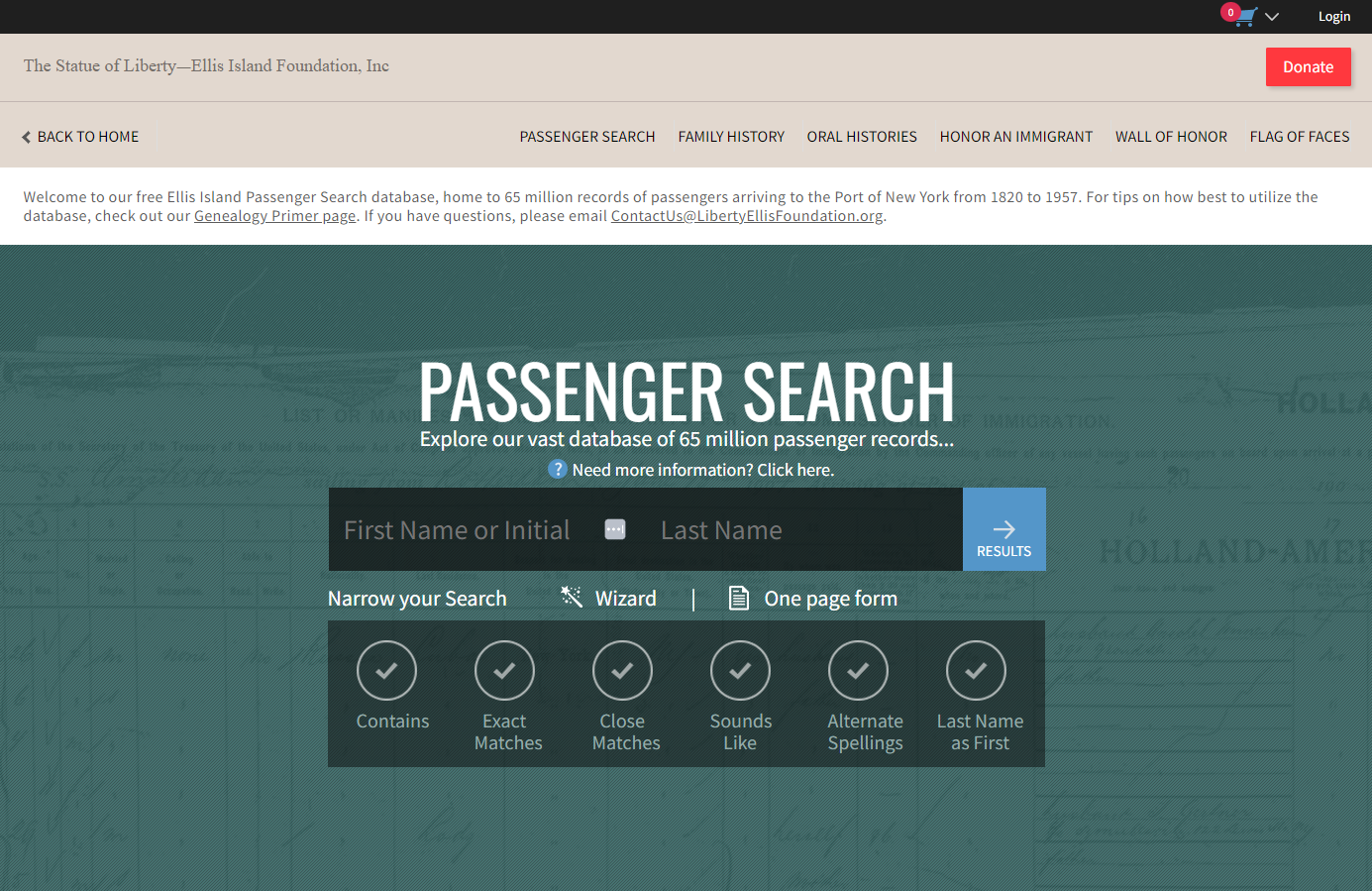 The largest American city since 1829, New York City holds the largest Jewish population in the world (more than Jerusalem and Tel Aviv combined). As the main US port of immigration between 1880 and 1925, New York was the entry point into the country for approximately 60-80% of immigrants to the United States during its peak years of Jewish immigration.
The largest American city since 1829, New York City holds the largest Jewish population in the world (more than Jerusalem and Tel Aviv combined). As the main US port of immigration between 1880 and 1925, New York was the entry point into the country for approximately 60-80% of immigrants to the United States during its peak years of Jewish immigration.
The Statue of Liberty – Ellis Island Foundation database holds immigration records for millions of immigrants who passed through its doors, both Jewish and non-Jewish. According to its mission statement, the foundation aims to “honor the immigrant experience and the pursuit of freedom” and to “create bridges to history and to foster an appreciation for the rich tapestry of our national identity.”
In Conclusion
If you want to do some of your own genealogy research, the first steps on your journey should be some of the resources discussed on this page. The information teased out of them can be tantalizing. Yet using them requires a certain finesse, deductive skills, and plenty of self-education. Even more, they are starting points—not the final word on your genealogical search.
Every day, teams of volunteer researchers devote their time to decoding original records and manually adding information to databases so that it can be easily found. Their heroic efforts should be recognized, appreciated, and applauded. Yet even they cannot do everything. When searching for your family, the information you see on databases provides a keyhole view, not the whole picture.
One of the most fundamental professional standards and best practices of genealogy is to work with original, primary source documents rather than only with secondary sources. There are many reasons for this. As incredibly useful as these databases and resources are, they are transcriptions and translations, which can introduce errors. Moreover, they provide summaries of the records, allowing researchers to quickly discover relevant original records but leaving important details untranscribed. Even more, the genealogy standards require not only using primary sources, but critically evaluating them and corroborating them against one another. For all these reasons and more, genealogy research requires going beyond databases to work with original records—which for Jewish genealogy will frequently require highly specialized skills.
Are you researching your family and wondering how much more information might be available beyond what databases and beginner-friendly tools can provide? Are you stuck in your research, wanting to go further but unable to or unsure how to proceed? If so, please feel free to explore other portions of my website, or contact me at 888-96-LOSTRTS (888-965-6787) to schedule a research appointment. You can also e-mail me by visiting https://lostrootsfamilyhistory.com/contact.
